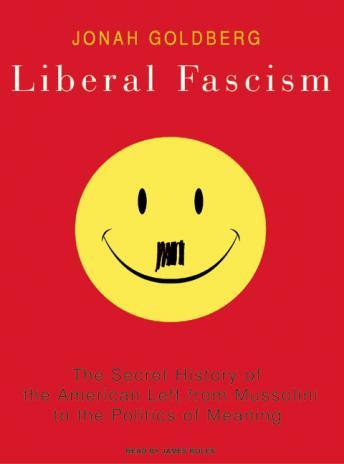 Taking a few days off from the blog has at least given me a chance to finish reading Jonah Goldberg's Liberal Fascism. This book (buy here) was a bit of an eye-opener for me, setting out in mind-boggling detail the links - both historical and philosophical - between fascism and the ideas espoused by modern day liberals and progressives. The sheer weight of evidence is extraordinary - from welfare, to land reform, to greenery, to the worship of the state it's hard to find any other areas of public policy in which the two have so much in common. (Goldberg points out that anti-semitism was part of the Nazi creed, but not that of the Italian or Spanish fascists, and was therefore a policy of Hitlerism, but not really of fascism.)
Taking a few days off from the blog has at least given me a chance to finish reading Jonah Goldberg's Liberal Fascism. This book (buy here) was a bit of an eye-opener for me, setting out in mind-boggling detail the links - both historical and philosophical - between fascism and the ideas espoused by modern day liberals and progressives. The sheer weight of evidence is extraordinary - from welfare, to land reform, to greenery, to the worship of the state it's hard to find any other areas of public policy in which the two have so much in common. (Goldberg points out that anti-semitism was part of the Nazi creed, but not that of the Italian or Spanish fascists, and was therefore a policy of Hitlerism, but not really of fascism.)
But what struck me about the book was how often I noticed that there are also clear parallels between fascism and environmentalism. At a high level, both are alt-religions, which their adherents seek to impose on society with Jesuit fervour, spurred on by fear of impending disaster. Both are openly totalitarian, in the original sense of the word: in other words the creed is supposed to apply in every aspect of life, in every area of policy, and in the private sphere as much as in the public.
The methods are often the same too. Where fascists tried to generate an almost permanent sense of crisis in order to unite their country (Mussolini) or their volk (Hitler) around a share sense of national purpose, environmentalists try to create a permanent sense of ecological breakdown in order to unite society around their programme.
But at a detailed policy level too, the parallels are remarkable. From attempts to change diets, to the hijacking of the education system, it's the same thing. And the methods have remarkable similarities too, with guilt used as a tool, the language abused in service of political ends and the use of cod-psychologists to target dissenters. And even more sinister are the common history of fascism, environmentalism, population concerns and eugenics.
Goldberg is keen to point out that the liberal and progressive left of today do not share the violent tendencies of their fascist forebears: theirs is a gentler totalitarianism (again in the original sense of the word). The same case can be made for the greens. At least for now; it is hard to avoid observing that their rhetoric is becoming steadily more violent and the calls for unmistakably fascist policy measures are ever more common.
Watch with care.